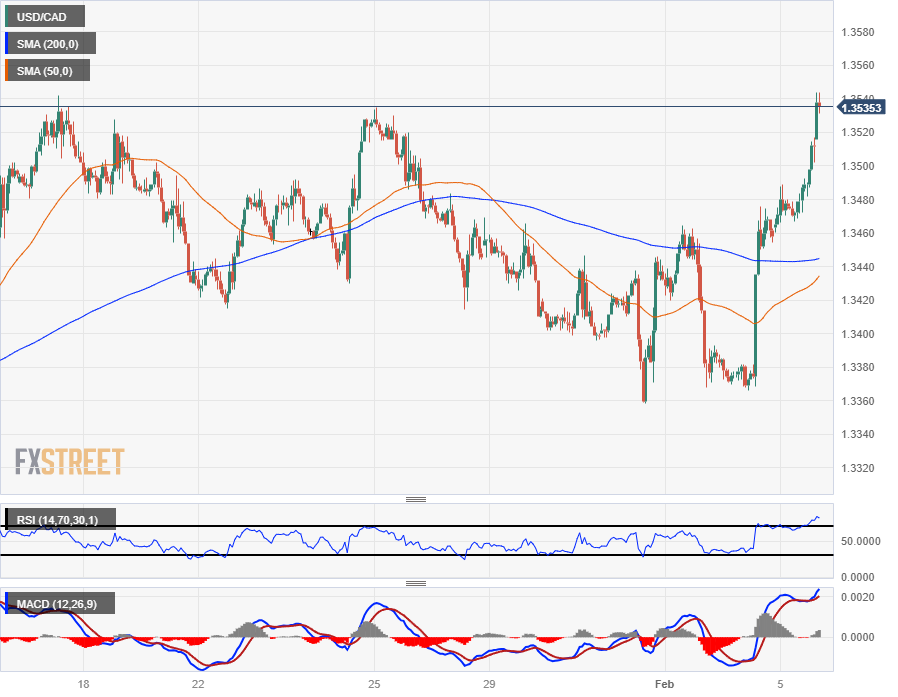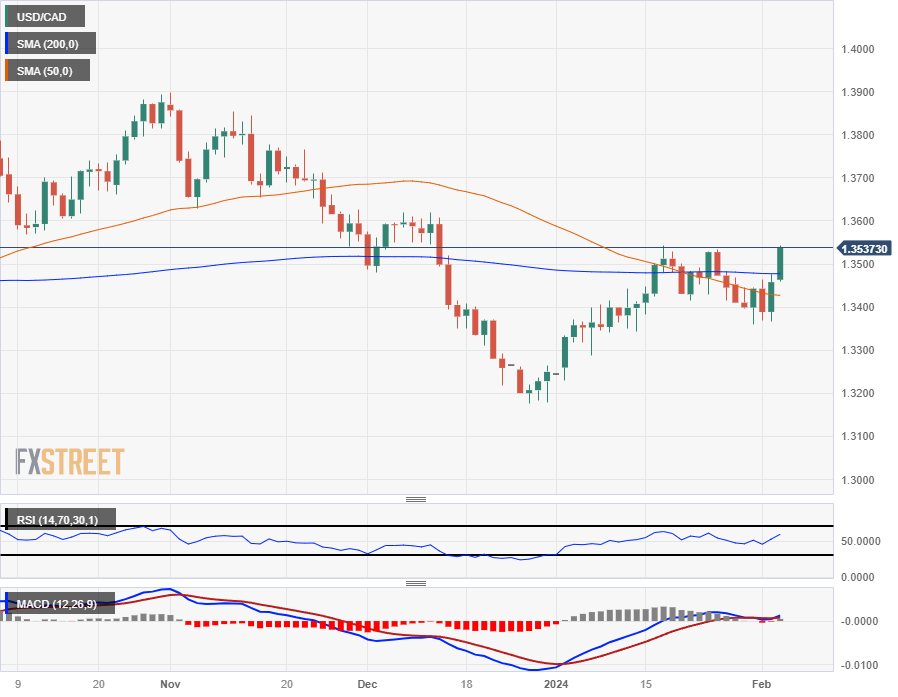- Phân tích
- Tin tức và các công cụ
- Tin tức thị trường
- Canadian Dollar slumps further as markets pile into Greenback
Canadian Dollar slumps further as markets pile into Greenback
- Canadian Dollar hits eight-week low after US PMI surge.
- Canada sees BoC Governor Macklem slated for Tuesday.
- US Fed policymaker statements weigh on Monday markets.
The Canadian Dollar (CAD) is broadly lower on Monday after a broad market dogpile into the US Dollar (USD) after US ISM Services Purchasing Managers Index (PMI) figures came in well above expectations. Additionally, mixed comments from US Federal Reserve (Fed) policymakers risk investor outlooks, hampering risk appetite.
Bank of Canada (BoC) Governor Tiff Macklem is slated to speak and answer questions regarding monetary policy transmission in Quebec on Tuesday, leaving the Canadian Dollar absent meaningful domestic releases on Monday.
Daily digest market movers: Canadian Dollar backslides as markets readjust expectations
- US data, Fedspeak dominates currency flows on Monday with Canada absent on the economic calendar.
- The US ISM Services PMI for January climbed to 53.4 versus the forecast of 52.0, accelerating above the previous month’s 50.5, which saw only minor revisions.
- US ISM Services Prices Paid hit an 11-month high as businesses continue to see inflationary pressure in January, up sharply from December’s 56.7 (revised down from 57.4).
- US ISM Services New Orders Index rebounds to 55 in January from December’s 52.8 as economic activity continues to stubbornly vex markets, which hope for earlier rate cuts.
- Minneapolis Fed President Neel Kashkari noted on Monday that higher neutral rates might mean that monetary policy may not be as tight as previously thought.
- Fed’s Kashkari also noted that despite broadly positive US data, some weak points remain, notably rising consumer delinquencies.
- Chicago Fed President Austan Goolsbee pulled up short of Fed Kashkari’s earlier statements, noting that while he needs to see more inflation progress in the data itself, he won’t rule out a March rate cut entirely.
- The CME’s FedWatch Tool sees money markets pricing in barely a 15% chance of a rate cut in March.
Canadian Dollar price today
The table below shows the percentage change of Canadian Dollar (CAD) against listed major currencies today. Canadian Dollar was the weakest against the US Dollar.
| USD | EUR | GBP | CAD | AUD | JPY | NZD | CHF | |
| USD | 0.45% | 0.75% | 0.50% | 0.43% | 0.16% | 0.24% | 0.47% | |
| EUR | -0.45% | 0.32% | 0.04% | 0.00% | -0.28% | -0.18% | 0.02% | |
| GBP | -0.76% | -0.31% | -0.27% | -0.34% | -0.61% | -0.51% | -0.29% | |
| CAD | -0.49% | -0.04% | 0.27% | -0.05% | -0.32% | -0.23% | -0.02% | |
| AUD | -0.46% | 0.00% | 0.30% | 0.05% | -0.30% | -0.21% | 0.01% | |
| JPY | -0.19% | 0.26% | 0.55% | 0.33% | 0.25% | 0.06% | 0.28% | |
| NZD | -0.28% | 0.18% | 0.48% | 0.23% | 0.15% | -0.12% | 0.19% | |
| CHF | -0.47% | -0.02% | 0.29% | 0.01% | -0.03% | -0.30% | -0.22% |
The heat map shows percentage changes of major currencies against each other. The base currency is picked from the left column, while the quote currency is picked from the top row. For example, if you pick the Euro from the left column and move along the horizontal line to the Japanese Yen, the percentage change displayed in the box will represent EUR (base)/JPY (quote).
Technical analysis: Canadian Dollar softens across the board, USD/CAD tests eight-week highs
The Canadian Dollar (CAD) sees broad losses on Monday as the Loonie sheds weight against nearly all of its major currency peers in the new trading week. The CAD is sharply lower against the US Dollar, down half a percent on Monday, with the CAD shedding a third of a percent against the Japanese Yen (JPY) and a quarter of a percent against the New Zealand Dollar (NZD). Despite broad selling pressure, the CAD still gained a quarter of a percent against the Pound Sterling (GBP), Monday’s weakest-performing currency, forcing the Canadian Dollar to settle for second-worst.
The Canadian Dollar’s declines on Monday sees the USD/CAD testing back over the 1.3500 handle, running into near-term technical resistance at familiar intraday swing highs near 1.3540.
Monday’s USD/CAD surge sees the pair trading back into the high end of the 200-day Simple Moving Average (SMA) below the 1.3500 handle, and the pair is pushing into eight-week highs with an immediate technical ceiling weighing down from 1.3600.
USD/CAD hourly chart
USD/CAD daily chart
Canadian Dollar FAQs
What key factors drive the Canadian Dollar?
The key factors driving the Canadian Dollar (CAD) are the level of interest rates set by the Bank of Canada (BoC), the price of Oil, Canada’s largest export, the health of its economy, inflation and the Trade Balance, which is the difference between the value of Canada’s exports versus its imports. Other factors include market sentiment – whether investors are taking on more risky assets (risk-on) or seeking safe-havens (risk-off) – with risk-on being CAD-positive. As its largest trading partner, the health of the US economy is also a key factor influencing the Canadian Dollar.
How do the decisions of the Bank of Canada impact the Canadian Dollar?
The Bank of Canada (BoC) has a significant influence on the Canadian Dollar by setting the level of interest rates that banks can lend to one another. This influences the level of interest rates for everyone. The main goal of the BoC is to maintain inflation at 1-3% by adjusting interest rates up or down. Relatively higher interest rates tend to be positive for the CAD. The Bank of Canada can also use quantitative easing and tightening to influence credit conditions, with the former CAD-negative and the latter CAD-positive.
How does the price of Oil impact the Canadian Dollar?
The price of Oil is a key factor impacting the value of the Canadian Dollar. Petroleum is Canada’s biggest export, so Oil price tends to have an immediate impact on the CAD value. Generally, if Oil price rises CAD also goes up, as aggregate demand for the currency increases. The opposite is the case if the price of Oil falls. Higher Oil prices also tend to result in a greater likelihood of a positive Trade Balance, which is also supportive of the CAD.
How does inflation data impact the value of the Canadian Dollar?
While inflation had always traditionally been thought of as a negative factor for a currency since it lowers the value of money, the opposite has actually been the case in modern times with the relaxation of cross-border capital controls. Higher inflation tends to lead central banks to put up interest rates which attracts more capital inflows from global investors seeking a lucrative place to keep their money. This increases demand for the local currency, which in Canada’s case is the Canadian Dollar.
How does economic data influence the value of the Canadian Dollar?
Macroeconomic data releases gauge the health of the economy and can have an impact on the Canadian Dollar. Indicators such as GDP, Manufacturing and Services PMIs, employment, and consumer sentiment surveys can all influence the direction of the CAD. A strong economy is good for the Canadian Dollar. Not only does it attract more foreign investment but it may encourage the Bank of Canada to put up interest rates, leading to a stronger currency. If economic data is weak, however, the CAD is likely to fall.
© 2000-2026. Bản quyền Teletrade.
Trang web này được quản lý bởi Teletrade D.J. LLC 2351 LLC 2022 (Euro House, Richmond Hill Road, Kingstown, VC0100, St. Vincent and the Grenadines).
Thông tin trên trang web không phải là cơ sở để đưa ra quyết định đầu tư và chỉ được cung cấp cho mục đích làm quen.
Giao dịch trên thị trường tài chính (đặc biệt là giao dịch sử dụng các công cụ biên) mở ra những cơ hội lớn và tạo điều kiện cho các nhà đầu tư sẵn sàng mạo hiểm để thu lợi nhuận, tuy nhiên nó mang trong mình nguy cơ rủi ro khá cao. Chính vì vậy trước khi tiến hành giao dịch cần phải xem xét mọi mặt vấn đề chấp nhận tiến hành giao dịch cụ thể xét theo quan điểm của nguồn lực tài chính sẵn có và mức độ am hiểu thị trường tài chính.
Sử dụng thông tin: sử dụng toàn bộ hay riêng biệt các dữ liệu trên trang web của công ty TeleTrade như một nguồn cung cấp thông tin nhất định. Việc sử dụng tư liệu từ trang web cần kèm theo liên kết đến trang teletrade.vn. Việc tự động thu thập số liệu cũng như thông tin từ trang web TeleTrade đều không được phép.
Xin vui lòng liên hệ với pr@teletrade.global nếu có câu hỏi.















